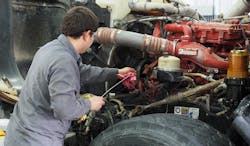Exxon Mobil: Still two more years before FA-4 oil widely adopted
Though the it can improve fuel economy and significantly lengthen drain intervals, Paul Cigala, commercial vehicle lubricants applications engineer for ExxonMobil, believes it’s still going to take between one and two more years – somewhere in the 2019 to 2020 timeframe – before a sizable number of truckers begin to switch over to the FA-4 engine oil blend introduced back in 2016.
“Detroit Diesel is really the only OEM that’s allowed backward compatibility of FA-4 back to their 2010-model engines,” he explained to Fleet Owner during the Technology & Maintenance Council (TMC) 2018 annual meeting held in Atlanta. “Fleets are telling us it’s going to be a year or two before they start using the new oil, as they are going to wait until they bring newer [truck] units approved to use it or more OEMs approve it.”
The complicating factor is that most fleets just want to use one motor oil for all their equipment. And since FA-4 is not approved across the board yet, they’d have to stock two or more to use it, which increases the fear of misapplication – putting the wrong oil in the wrong engine.
“Customers don’t want to use one oil in their new truck and a different one in their old trucks. But it’s not just truck engines; it’s the small motors in APUs [auxiliary power units] and refrigeration units, too,” Cigala explained. “The APU and reefer unit manufacturers say they need to wait to see what their engine suppliers do. But these are small 25 hp engines we’re talking about; they don’t generate the power and torque the bigger truck engines do. The new oils will work fine in them.”
Still, he noted that though the “smaller” engines powering APUs and reefer units only use about three to four gallons of oil, that volume adds up based on how many of them are in a fleet. So stocking a second oil just for their needs would add up considerably in cost over time, Cigala said.
“It’s really about optimizing for the most maintenance value first with motor oil, then looking at the fuel economy benefit,” he pointed out, noting that in ExxonMobil’s case, the synthetic blends of its new CK-4 and FA-4 oils are formulated using the exact same chemical additive package. However, FA-4 has a different high temperature/high shear component and it’s viscosity is thinner, which is what helps it boost fuel economy.
And both should be able to offer extended oil drain intervals of 80,000 miles or more, depending on a truck’s application and duty cycle, Cigala added.
Yet even though fleets ExxonMobil is talking to “are very interested” in further fuel economy gains while lengthening oil intervals, the more-than-one-oil-to-stock problem isn’t going away soon. “Fleets are even shifting trucks that come factory-filled with FA-4 back to CK-4 right so they don’t have to face that issue,” he said.
About the Author
Sean Kilcarr
Editor in Chief
Sean Kilcarr is a former longtime FleetOwner senior editor who wrote for the publication from 2000 to 2018. He served as editor-in-chief from 2017 to 2018.
